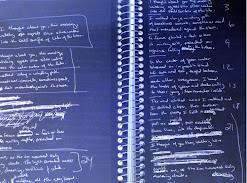I woke up early this morning, after an inability to sleep. I knew I could read a book or magazine, but I chose to turn on my computer and see what's going on in the world. I subscribe,via email, to both the LA Times and the New York Times, because I value real newspapers. (Our StarTrib doesn't cut it at all.) I came across two articles, one in each paper, which made me feel both fortunate and afraid.
First, fortunate. In Iraq, infrastructure is a huge problem. When you have daily battles (or sectarian/civil violence, if you prefer), you have insurmountable difficulties getting the basic services to people. Libraries are included in daily services. While this might seem like a luxury to some, it is a necessary service to many. It helps build education and creates, rather than destroys, connections between people. It also preserves a culture that seems, at the moment, doomed.
Saad Eskander, the director of the Iraqi libraries and archives, has been having huge struggles keeping his country's library going. His computer system is spotty, due to bullet damage. He loses librarians to death threats and violence. After much debate, he has decided to publish a blog about his struggles. After reading a little of his blog, I feel fortunate to be able to take the bus down to the downtown library and simply borrow a book.
Now, onto afraid. In super-liberal, super-literate San Fransisco, independent bookstores are beginning to close down. This is a city that helped spark the Beat movement, through its bookstores. The article cites Amazon.com as the biggest detractor to sales, as well as the big box or mall bookstores. This has been happening for years in the Twin Cities most notably with the loss of Ruminator Books in St. Paul. We are slowly dwindling to a metro area that only uses big box bookstores to buy their books.
I am a little conflicted by this issue, due in part to the fact that my husband worked for an independently styled big box location for years. His store wasn't evil. There was no cafe, an awesome poetry collection, and staff members who were dedicated to reading. And his store was leaking money like sieve, which lead to its eventual closing. It was the last of its kind in our city. Now, every other big box bookstore is suburban and caters to the cafe/DVD/CD market. Ironically enough, the 3 independent bookstores in the same neighborhood outlasted my husband's corporate store.
Honestly, I do blame the indie bookstores, just a little. They do have supply chain issues (IE getting books on time or at all). They also have not adapted to the online marketplace, as well as they could. Besides, the big box stores are being spanked by Amazon as much as everyone else.
So, I guess what I'm trying to say, in this long-winded, somewhat connected post, is that we should protect the biodiversity of our reading options, here and abroad. My overall fear is that we only have one or two options to buy our books. These people get to decide what we read, by catering to sales or availability, which in turn, limits our reading. This limits our access to all knowledge, which is a terrifying thought.




2 Comments:
I read that article also about bookstores in SF. It is pretty sad, although I have to admit that I am part of the problem myself, since I buy most of my books online, even though I live in a big city with many other options. In a way, online bookstores are a godsend for those in small towns that would find it hard to easily get a book that wasn't a bestseller. But I do miss those small bookstores where employees used to really care about their books.
I am totally part of the problem, too. I like my Amazon, my Borders, my convenience. But I also like my complaining... :) I guess its a bit of a bittersweet and semi-self-inflicted loss for us writers.
Post a Comment